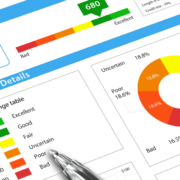Starting the initial steps of a divorce can feel overwhelming. You may be unsure what processes to prioritize or how to set yourself up for success. One step you can take now is requesting a copy of your credit report.
This can aid you in your next steps as you start to move forward financially after the property division process.
Why Do You Need Your Credit Report?
Your credit report offers a summary of your credit activity, including loans and other debts. It includes information such as your:
- Bill payment history
- Bankruptcy history
- Loans
- Current debts
When you apply for loans or other financial opportunities, the financial institution will view your report to determine your trustworthiness and eligibility. If you have a significant amount of debt or a history of late payments, it may deny your application.
Requesting a copy of your report can help you prepare for certain financial processes in your divorce, such as refinancing your mortgage or applying for an apartment rental. If this report paints a negative picture of your finances, you can start taking steps now to improve your credit or explore other opportunities that won’t hinge on your creditworthiness.
You can also identify any hidden debts or assets that will eventually come to light during the marital dissolution process. If you find any discrepancies in your report, potentially indicating malicious behavior from your spouse, you can address them now.
Protecting Your Credit During and After Divorce
Divorce can have indirect consequences on your credit score, which could limit future financial opportunities. Years of marriage and combined finances can be challenging to untangle. These tips may help you protect your credit during the divorce process:
- Keep an eye on your report. Free copies are available online, allowing you to quickly identify any changes or issues.
- Close credit cards and pay off loans wherever possible.
- Change the account numbers on the remaining accounts so your spouse does not accidentally or maliciously use them.
- Put a lock on your credit so your spouse cannot open any new accounts under your name.
If your score is on the lower side, take steps now to begin building credit. You might apply for a secured credit card, practice making bill payments on time, and reach out to a credit counselor for help.
How To Request a Copy of Your Credit Report
You should never need to pay for a copy of your credit report. You can request a free report as often as once per week through AnnualCreditReport.com, a service authorized by federal law.
You will need to answer a few personal questions before you can see your reports. This ensures that no one else can access your information aside from you.
Let Karen Ann Ulmer, P.C., Help You Protect Your Finances During Divorce
Legal separation and divorce can strain your finances. At Karen Ann Ulmer, P.C., we help clients protect their rights while divorcing. Let us guide you through the settlement agreement, divorce petition, alimony discussions, and more. Call (866) 349-4149 to schedule a general consultation.






